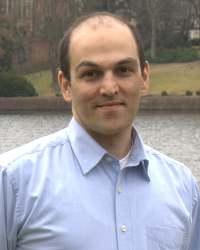Dr. Kia Teymourian

Faculty Spotlight.
Meet Dr. Kia Teymourian, Assistant Professor of Computer Science. Dr. Teymourian holds a PhD from Freie Universität Berlin as well as a MS and BS from Berlin University of Technology (TU-Berlin).
What is your area of expertise?
My expertise is in real-time data stream analytics and distributed event-based systems. Data stream is an unbound sequence of data items that arrive and systems need to process them as soon as possible, such as live stream of sensor data, market trade data, and social media streams.
In my PhD, I have worked on knowledge-based data stream processing and developed a novel system for using background knowledge to detect complex patterns from data streams.
I am generally interested in large-scale data analytics, extracting new knowledge from large data sets by using existing data analytic systems, and developing new models and systems for real-time processing data.
Please tell us about your work. Can you share any current research or recent publications?
My research interest is about developing high-salable data stream processing systems. This field is a combination of database technology, data analytics, distributed systems, and other fields such as logic programming. Today’s data streams are big in their velocity; for instance, we have use cases with high throughput data stream, e.g., petabytes of data in milliseconds, so that new models and systems are required.
Currently, I am working on an experimental evaluation of different data models and data serialization approaches for usage in distributed data stream processing. Each time data items are sent over the network or written onto a disk, the systems need convert them from memory representations into binary representations that can be transported over the network or be written to disk. Different systems and libraries are developed for data serializations in multiple programming languages. We are doing an experimental evaluation of these different cases with the goal of identifying their advantages and disadvantages. We have already published some of our results.
How does the subject you work in apply in practice? What is its application?
Data stream processing is a cross-cutting technology with a wide range of applications.
It has applications monitoring systems for different purposes, such as, for example, hospital hygiene monitoring (monitoring the spread of resistance bacteria in a hospital) or monitoring of the health situation of newborn babies in ICUs (monitoring multiple sensor outputs). Other applications include fraud detection systems (monitoring credit card transactions) or intrusion detection in an Intranet network.
Also, you find applications in lots of other fields like business intelligence, automated trading, and earthquake and tsunami detection in a nanoseconds range.
What course(s) do you teach at MET?
I am teaching Data Analysis and Visualization with R (MET CS 555), Cloud Computing (MET CS 755), and Software Design and Patterns (MET CS 665).
For the fall semester 2018, I am planning to teach a new class called “Big Data Analysis” on campus, schedule TBA.
Please highlight a particular project within this course(s) that most interests your students. If you previously worked in industry, what “real-life” exercises do you bring to class?
In my cloud computing class we use real-world data sets for assignments and projects, such as New York Taxi data sets (a data set that includes all NYC taxi pickups and drop-offs with time and GPS) or the live data stream from social media. Students had huge interest in the analysis and processing of such real-world data sets, to learn about the extracted knowledge from data. For example, in one of the assignments we wanted to know if we can extract important city events from taxi data, or where are the top-10 places that New Yorkers go on Sundays and if it differs from other days.
Working with real-world data sets in general has a high attraction for students because they learn about the whole data processing pipeline, from data cleaning, modeling, and testing, to finally extracting some real and unexpected results from the data.
Do you have any interesting hobbies or talents outside of the classroom?
My hobbies are reading news articles in computer science, like reading hacker news. From time to time, I use my extra time to contribute to open source software projects. I like to hear Persian traditional music and read history e-books.
What advice do you have for this year’s graduates?
Go out and do something. It does not matter if your ideas are not perfect; you should realize your ideas and then improve them to perfection.